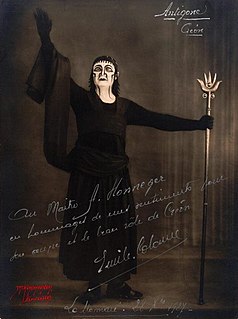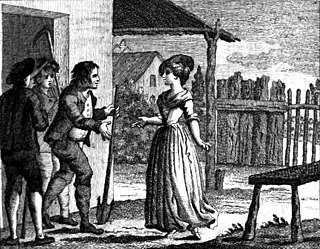Related Research Articles

Asrael is a leggenda or opera in four acts by composer Alberto Franchetti and librettist Ferdinando Fontana. The plot, based on German fairy tale and folklore, displays the conflict between the spirit of evil and the spirit of Christian love, represented by Asrael and Nefta respectively. The work is Franchetti's first opera and displays strong influences of Meyerbeer and Wagner, mixed with late 19th-century Italian idioms. The opera premiered at the Teatro Municipale di Reggio on 11 February 1888. The opera made its United States debut at the Metropolitan Opera on 26 November 1890 with Andreas Dippel in the title role.

La canterina, Hob. XXVIII/2, is a short, two-act opera buffa by Joseph Haydn, the first one he wrote for Prince Esterhazy. Based on the intermezzo from the third act of Niccolò Piccinni's opera L'Origille (1760), it lasts about 50 minutes. It was written in 1766, and was premiered in the fall of that year.

Alessandro Severo is an opera by George Frideric Handel composed in 1738. It is one of Handel's three pasticcio works, made up of the music and arias of his previous operas Giustino, Berenice and Arminio. Only the overture and recitatives were new. The impresario Johann Jacob Heidegger probably selected the 1717 libretto by Apostolo Zeno, originally written for Antonio Lotti and re-used by many composers thereafter.
Le diable à quatre is an opéra comique in three acts by Christoph Willibald Gluck. The French-language libretto is by Michel-Jean Sedaine and Pierre Baurans, after a translation by Claude-Pierre Patu of the 1731 ballad opera by Charles Coffey entitled The Devil to Pay, or The Wives Metamorphos’d. It was first performed at Laxenburg on May 28, 1759. The work was a popular success. Joseph Haydn used a melody from it, "Je n’aimais pas le tabac beaucoup " in the first movement of his symphony Le soir.

Proserpine (Proserpina) is an opera with music by Jean-Baptiste Lully and a libretto by Philippe Quinault first performed at Saint-Germain-en-Laye on 3 February 1680.

Roma is an opera in five acts by Jules Massenet to a French libretto by Henri Cain based on the play Rome vaincue by Dominique-Alexandre Parodi. It was first performed at the Opéra de Monte Carlo on 17 February 1912.

Zoroastre (Zoroaster) is an opera by Jean-Philippe Rameau, first performed on 5 December 1749 by the Opéra in the first Salle du Palais-Royal in Paris. The libretto is by Louis de Cahusac. Zoroastre was the fourth of Rameau's tragédies en musique to be staged and the last to appear during the composer's own lifetime. Audiences gave the original version a lukewarm reception, so Rameau and his librettist thoroughly reworked the opera for a revival which took place at the Opéra on 19 January 1756. This time the work was a great success and this is the version generally heard today.

Calliroe is an opera by Antonio Sacchini, set to a libretto by Mattia Verazi. It was first performed in Schloss Ludwigsburg on 11 February 1770 and the ballets were set by French choreographer Louis Dauvigny.

Viola is an unfinished romantic opera by Bedřich Smetana. The libretto was written by Eliška Krásnohorská, and is based on Shakespeare's play Twelfth Night. The composer did some work on it in 1874 and then came back to it in 1883, when he only managed to orchestrate a few scenes; the opera was left incomplete upon Smetana's death in 1884.
Der Widerspänstigen Zähmung is a German-language comic opera in four acts by the German composer Hermann Goetz. It was written between 1868 and 1872 and first performed at the National Theatre Mannheim on 11 October 1874 under the conductor Ernst Frank. The libretto, by Joseph Victor Widmann and the composer, is based on Shakespeare's The Taming of the Shrew. The style of the opera shows Goetz turning away from the musical ideas of Richard Wagner towards the classicism of Mozart. Der Widerspänstigen Zähmung was a huge success, not only in Germany but in the United States and in Great Britain, where it received high praise from George Bernard Shaw.

Hélène is a poème lyrique or opera in one act by composer Camille Saint-Saëns. It is the first opera for which Saint-Saëns wrote his own French libretto, which is based on the classic story of Helen of Troy and Paris from Greek mythology. The opera premiered at the Opéra de Monte-Carlo in Monaco on 18 February 1904. Moderately successful, the opera enjoyed a handful of revivals up through 1919, after which it fell out of the performance repertoire. The work was resurrected in 2008 for its world premiere recording by the Australian music label Melba.

Antigone is an opera in three acts by Arthur Honegger to a French libretto by Jean Cocteau based on the tragedy Antigone by Sophocles. Honegger composed the opera between 1924 and 1927. It premiered on 28 December 1927 at the Théâtre Royal de la Monnaie with sets designed by Pablo Picasso and costumes by Coco Chanel.

L'empio punito is an opera by composer Alessandro Melani. Notably the first opera written on the subject of Don Juan, the work uses an Italian language libretto by Giovanni Filippo Apolloni and Filippo Acciaiuoli. The opera was commissioned by Marie Mancini for performance during Carnival of 1669. The work premiered at the Teatro di Palazzo Colonna in the historic Borgo district of Rome on 17 February 1669.

Medea is an opera in three acts composed by Giovanni Pacini to a libretto by Benedetto Castiglia. It premiered on 28 November 1843 at the Teatro Carolino in Palermo, conducted by the composer with Geltrude Bortolotti in the title role. The libretto is based on the plays Medea by Euripides and Médée by Pierre Corneille.

Semiramide riconosciuta is an Italian opera with serious action, or dramma per musica, by Nicola Porpora, set to a libretto by Metastasio with some textual changes, possibly by Domenico Lalli. The opera was written for some of the finest contemporary singers, and includes a technically demanding series of da capo arias.
Cecilia Davies was an English classical soprano who had an active international career in concerts and operas during the second half of the 18th century. In Italy she was known as "l'Inglesina". She was the sister of Marianne Davies who was the first professional glass harmonica musician. She sang in several world premieres during her career, including Thomas Arne's Love in a Village and Josef Mysliveček's La Circe.

Il filosofo di campagna is a dramma giocoso per musica in 3 acts by composer Baldassare Galuppi. The opera uses an Italian language libretto by Carlo Goldoni. The work premiered at the Teatro San Samuele in Venice on 26 October 1754.
Der Sturm is a German-language opera in three acts and an epilogue by the Swiss composer Frank Martin to a libretto based on the Schlegel/Tieck German translation of Shakespeare's play The Tempest. Martin's only opera was premiered at the Vienna State Opera on 17 June 1956. The role of Prospero was originally conceived for Dietrich Fischer-Dieskau, but illness prevented him participating, although Casaglia lists Fischer-Dieskau in the role of Sebastian, but a playbill for the premiere lists Ljubomir Pantscheff in that role.

Maria Carbone was an Italian operatic soprano. She created the lead female roles in two of Gian Francesco Malipiero's operas: the title role in Ecuba and Cleopatra in Antonio e Cleopatra.
Mattia Verazi was an Italian librettist primarily active at the court of Charles Theodore in Mannheim. He became known as the leader of a group of librettists who challenged the conventions of opera seria in the mid-18th century and was a long-time collaborator of composer Niccolò Jommelli. He also produced the libretti for Salieri's Europa riconosciuta, Sacchini's Calliroe, and J. C. Bach's Temistocle
References
- 1 2 Casaglia, Gherardo (2005). "The Tempest, 11 February 1756" . L'Almanacco di Gherardo Casaglia (in Italian).
